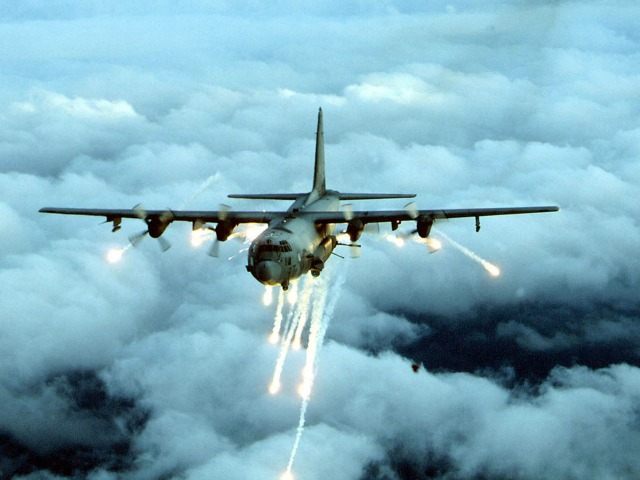General Raymond Thomas, the head of U.S. Special Operations Command, said at a conference in Tampa, Florida, on Wednesday that “adversaries” are jamming U.S. Air Force electronics in Syria, creating what he described as “the most aggressive EW environment on the planet.”
“They’re testing us every day, knocking our communications down, disabling our AC-130s, et cetera,” General Thomas said at the GEOINT 2018 symposium.
EW stands for electronic warfare, while the AC-130 is a gunship employed for close air support of U.S. and allied ground forces. The general’s remarks suggest that electronic warfare activity directed at American planes is jeopardizing the safety of our troops on the ground.
The Drive, which first reported Thomas’ remarks, added a few caveats about this explosive revelation:
Other reports have suggested the general actually referred to the U.S. Air Force’s EC-130H Compass Call electronic warfare aircraft, but this does not appear to be the case when listening to recordings of the talk. In addition, Thomas says “our” aircraft and the EC-130s are not part of the Air Force’s Special Operations Command, which is assigned to SOCOM. Of course, he could also just be using “our” to describe American forces in Syria in general.
While Thomas did not specify which “adversaries” are responsible for the jamming activity, Russia is the only party active in Syria that would be capable of creating such an electronic warfare environment. U.S. officials this month accused the Russian military of jamming American drones in Syria in a manner that seriously affected U.S. military operations, particularly in the area around suspected chemical weapons attacks perpetrated by the Syrian regime.
Analysts pointed out that drones are relatively easy to jam, so if manned combat aircraft are now being affected, as Gen. Thomas indicated, the list of adversaries who could generate that level of electronic warfare threat is growing much shorter.
The Russians have displayed a keen interest in testing new equipment and tactics throughout their involvement in the Syrian civil war, and have also field-tested EW techniques in the Ukraine conflict. U.S. and NATO officials have warned about Russia’s rapidly developing strategy of “hybrid war” and the next stage of its evolution, “hyper warfare,” in which all-out attacks on both military and civilian electronics multiply the power of conventional ground and air forces. There are concerns that Russia is using American forces in Syria to test and refine the hybrid warfare systems developed in Ukraine.
Thomas’ address to GEOINT 2018 was primarily about the challenges of running Special Operations Command in an age of intense cyber warfare and electronic countermeasures. He mentioned the environment in Syria as one of the “wicked problems” his command faces.
He related an amusing anecdote about Google CEO Eric Schmidt giving SOCOM a poor “report card” for failing to use deep learning computer systems to deal with its problems, an assessment that made the new Special Operations commander angry enough to consider tossing Schmidt out of his car. In time he came to realize that Schmidt was correct, and it was important for the U.S. military to begin using advanced computer systems to process the enormous amounts of information it collects, while also taking care to ensure those systems are not compromised by enemy forces.
In short, Thomas was saying the U.S. is lagging behind in hybrid warfare, in part because the U.S. government has concerns about privacy and data security that simply do not trouble the authoritarian regimes that pose the greatest potential threat to us, China and Russia.
In an especially intriguing passage of his address highlighted by C4ISR.net, Thomas talked about making the transition from hybrid warfare to hyper warfare, which he defined as the rapidly approaching moment when artificially intelligent military systems can operate at blinding speed without human oversight.
Thomas likened this to turning a “safe switch” off and unleashing A.I. as a superweapon, which would turn those “wicked problems” faced by American and allied forces in Ukraine and Syria into hellish nightmares:
“Truthfully, I think we’ve got to embrace that because it may be a necessity if our satellites aren’t working or if our comms aren’t working; your ultimate deterrent might be [that] I’ve got this in lockup,” Thomas said, acknowledging that allowing machines to execute certain tasks independent of human action might be Skynet-ish, but it’s where the military has to go to maintain parity in degraded environments.
The military has to pursue these types of technologies because top competitors, such as China, “are not sitting ideally by in this stuff.”
Thomas went on to outline an article from BBC that described how the Chinese were able to find and arrest a single individual in a stadium of 61,000 using closed-circuit TVs and the like.
“I’m curious are they that advanced in facial recognition? Is that applicable for us in the future,” he said, recognizing this level of surveillance isn’t necessarily the American way of life.
“More of concern is where are they going to go as a totalitarian regime in terms of pushing that right into their military apparatus that would be more advanced than where we are potentially. We have got to compete there and not be considering the moment of whether machine learning is going to be something we’re going to embrace.”
If our deep learning machines are restrained systems with elaborate safeguards, while the enemy is training A.I. attack dogs on the bloody battlefields of Syria and using top-of-the-line American equipment for target practice with its electronic weapons, we are not going to like how the first hyper war engagement plays out.

COMMENTS
Please let us know if you're having issues with commenting.